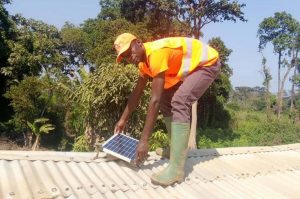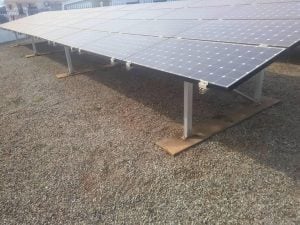Cameroon is touting the construction of solar energy in electricity-starved rural communities across the country as part of the government’s ambitious plans to become an emerging economy by 2035. The project, environmentalists and local council authorities say, will not only help fight against poverty but will also help save the country’s disappearing forest.
The rural solar power drive that has already taken off in some local councils government say is geared at bringing new development stimulating perspective that to change the livelihood of village communities. Cameroon’s President Paul Biya has also thrown his hefty weight behind the project.
“We will continue to provide our country with energy infrastructure to meet the needs of our agro-industry as well as the demands of our people. In addition to hydroelectric dams, thermal power, solar energy plants are being constructed for rural electrification,” Cameroon President Paul Biya said in his end of year address to the nation 31 December 2018.
The project, officials of the ministry of mines, water, and energy, say is part of a deal between Cameroon’s government and China’s Huawei telecommunications company, which also installs solar installations, to supply solar energy to more than 1000 village communities, largely in rural areas.
The first phase of the project that targeted some 166 villages started in 2017, the government says.
Before the project, solar power – much of it small-scale and often installed by non-governmental organizations provided only about one percent of Cameroon’s energy needs, according to 2017 government figures.
Officials of the ministry of mines, water, and energy in Yaounde say the country’s energy expansion plans that initially focused largely on fossil fuel plants and hydropower expansion, now includes renewable energy, especially in rural areas.
« The government is giving its total support to renewable energy initiatives that target rural communties, » Martine Akame Mesumbe, director of gas exploitation at the Ministry of Water and Energy, told InfoCongo.
The government hopes to boost Cameroon’s electricity access in rural areas as part of its drive towards emergence aimed at expanding the economy and slashing poverty to 10 percent, he says.
So far that expansion has been hampered by a lack of power, experts say. According to a 2018 World Bank report, just half of Cameroon’s people have access to electricity, with 80 percent of the supply concentrated in urban areas. Rural electrification is just 17 percent, the report states.
As part of its push to change that, the government now aims to reach 1000 communities, about 250000 people in total with solar power by the end of 2020, according to Mesumbe.
Altogether it hopes to get electricity, from a variety of sources to 40 percent of rural Cameroonians by 2020.
« This could drive significant economic change in rural Cameroon, » Mesumbe said.
More than $120 million in funding for the push is coming from a Bank of China loan for renewable energy projects, he said.
Protecting Forest
Environment experts have hailed the new push for greater use of solar power in energy-starved rural communities that could also help cut down worrying deforestation rates in Cameroon, home to part of Africa’s Congo Basin forests.
« The cutting of trees for wood and charcoal used for cooking and heating will now reduce in many villages with the coming of solar energy,” said Augustine Njamnshi, the Cameroon-based coordinator of the African Coalition for Sustainable Energy.
He says deficit in energy has stunted Africa’s development with an estimated 70% of people in Sub-Sahara Africa without reliable access to electricity.
In Cameroon and other countries in the Central African Economic and Monetary Community, businesses barely struggle as electricity remains costly and inconsistent, Augustine says.
Local councils and businesses are also backing the plan, which will help shore up efforts to conserve the indigenous forest.
Disappearing Forest
Cameroon’s disappearing forest has been attributed partly to the use of charcoal for energy and source of income for rural dwellers.
« Continuous abuses of forest resources by communities like the felling of trees for the production of charcoal as a source of income are some of the causes of climate change,” Says Njiforti Hanson, Country Director for World Wide Fund for Nature at the presentation in October 2018 of the devastating global climate trends highlighted in the 2018 Living Planet Report.
Cameroon’s forests are the second largest in Africa, at more than 23 million hectares. The government says they have a major role to play in the country’s economic development as well as the fight against climate change and in meeting global forest conservation targets.
Between 2001 and 2016, Cameroon lost nearly 900,000 hectares of trees, a 2.8 percent reduction in the country’s forests, according to 2017 data from Global Forest Watch, a forest monitoring initiative. Experts say the loss not only hurt ecosystems and drive climate change but hit the country’s economy as well.
« The economic and environmental impact of forest loss is really immeasurable, necessitating urgent measures to redress the problem,” said Paul Donfack, a consultant with the African Forest Forum.
Solar Brings Back Businesses in Mfou
Local council officials and rural dwellers in some of the communities that have already benefited from the project say their lives are changing for the better.
Mfou rural council in the Centre region, one of the communities now hooked up to solar panels, say they are happy to have a cleaner and less costly source of energy.
« It is a cheaper alternative to diesel generators and wood energy used in the past to power small businesses,” said Roger Belinga, the mayor of Mfou.
Jarome Angwi, a beer vendor in the town, said solar energy to power his refrigerator and beer parlor costs just a fifth of what he used to pay for diesel.
In addition, officials hope access to electricity will help keep youths from deserting rural areas for jobs in Cameroon’s cities.
« Some of those who left are already coming back since the solar panels were installed, Belinga said.
Financial challenges
However local council authorities in some towns have expressed worry on their lack of funds to train local solar technicians for the sustainability of the project.
« Many local councils do not have the financial resources to sustain these projects. They need financial support from the government, » Rose Ngassa, the mayor of Tombel, in southwest Cameroon told InfoCongo in an interview in Yaounde.
But government officials say an ongoing political decentralization push in Cameroon including an expected 70 percent boost in cash transferred to local authorities in 2019 should give local councils more money to invest in and maintain solar energy systems.
Experts say pursuing a wider range of renewable energy sources will help the government to drive not only its national development agenda but also that of other countries in the sub-region.
« With an abundance of sunlight, Cameroon just needs the political will to turn its energy deficiency into energy surplus, accessible not only to the remote parts of the country but also to neighboring countries, » said Augustine Njamnshi.


